How To Add Charts And Graphs To WordPress
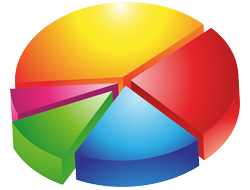
You’re probably familiar with the old adage “a picture is worth a thousand words.” This is certainly true when you are trying to present and explain complex information.
Using graphs and charts is useful for breaking up long text passages, and making statistical data more easily digestible.
You can use tables to present data, but if you want people to try and interpret complex information with figures, trends and relationships more easily, then graphs and charts are perfect for helping them interpret the information.

Graphs and charts help explain complex data so people can more easily understand it!
Need to add charts or graphs to WordPress? This step-by-step tutorial shows you how to use WP Visualizer – a simple, easy to use and powerful plugin for WordPress that allows you to create, manage and insert mobile-responsive graphs and charts into your WordPress posts and pages with just a few simple steps that:
- Your site visitors can interact with
- Allows you to add data from your computer or an online source of data
- Resizes dynamically for viewing on mobile devices
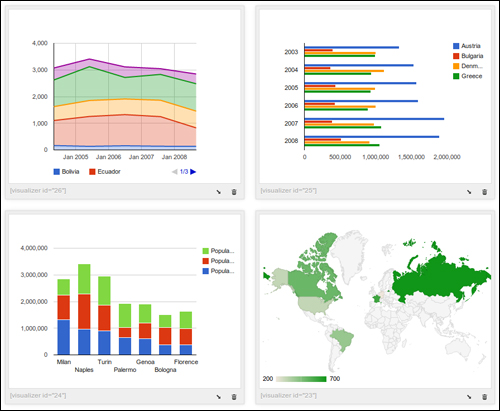
![]()
If you are displaying visual data like pie charts, comparison graphs or trending graphs containing static information (e.g. historical data), a simple method you can use is to create your charts or graphs using a desktop application, convert these into .jpg and .png images and then simply add the files and an image to your posts.
Use WordPress Chart & Graph Plugins
If you want to easily create interactive bars and graphs in your WordPress pages with no coding skills required, the easiest way to do this is to use a plugin.
Fortunately, there is a great free WordPress plugin that is simple to install, easy-to-use and allows you to not only create stunning and interactive graphs and charts, it also lets you populate your charts and graphs with updateable information.
WP Plugin: Visualizer

Visualizer URL
You can install the plugin inside your WP dashboard (explained a little further below), or download the Visualizer plugin from the link below:
http://wordpress.org/plugins/visualizer
Visualizer Description
WordPress Visualizer is a simple, easy to use and powerful tool that allows you to create, manage and insert stunning graphs into your WordPress posts and pages in a few mouse clicks.
The plugin uses Google Visualization API to render charts, which support cross-browser compatibility (adopting VML for older IE versions) and cross-platform portability to iOS and new Android releases, and are based on pure HTML5/SVG technology (adopting VML for old IE versions), so no additional plugins are required.
WordPress Visualizer also provides a variety of built-in optimized for all your data visualization needs, including:
- Line chart
- Area chart
- Bar chart
- Column chart
- Pie chart
- Geo chart
- Gauge chart
- Candlestick chart
- Scatter chart
Visualizer is a flexible and customizable plugin, allowing you to use Google Chart Tools with their default setting, or configure an extensive set of options to match your web design. Several options are available for each chart that allow you to customize their look and feel.
Additionally, charts are rendered using HTML5/SVG technology to provide cross-browser compatibility (including VML for older IE versions) and cross platform portability to iPhones, iPads and Android devices. Your site visitors can see your charts and graphs on their mobile device browsers without requiring the installation of any extra plugins.
How To Install The Visualizer Plugin
From your WordPress administration area, select Plugins > Add New from the dashboard menu …
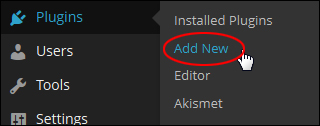
In the Add Plugins page type in search for “visualizer” and click enter …
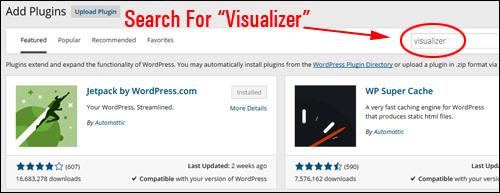
Locate the entry in the search results section and click the “Install Now” button …
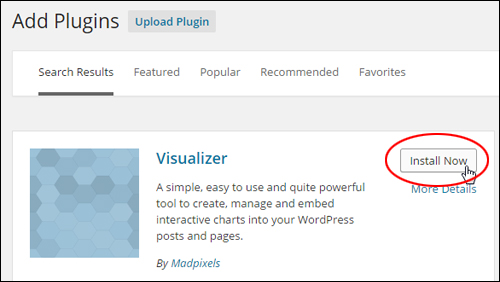
Click OK to continue …
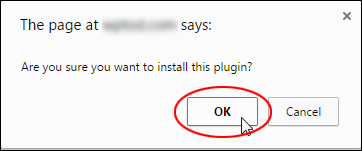
Activate the plugin after successfully installing it …
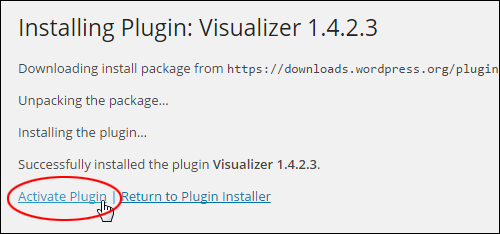
You can also activate the plugin in the Plugins page …

After the plugin has been activated, click on Library …

You can also get to the plugin’s ‘library’ screen by choosing Media > Visualizer Library in your main menu …
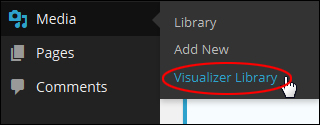
This takes you to the plugin’s Visualizer Library section …
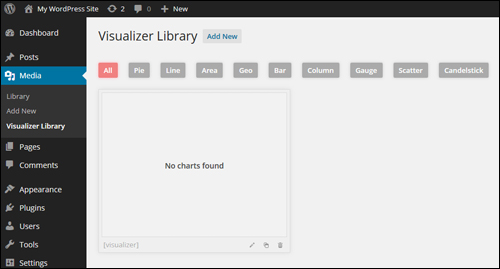
When you first install the plugin, the library will contain no charts.
The next step is to add the charts and graphs to your library that you plan to insert into your pages or posts.
How To Configure Visualizer
To add a chart or graph to the plugin’s library, click on Add New …
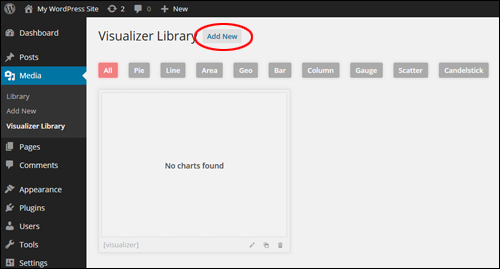
A visual gallery displaying all the types of charts and graphs available will come up on your screen.
Select the graph or chart type you would like to create and click on the ‘Next’ button …
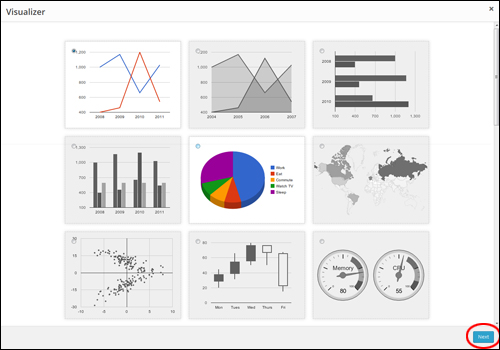
The selected graph/chart type will open up in a lightbox.
The next step is to upload a CSV file that contains your data …
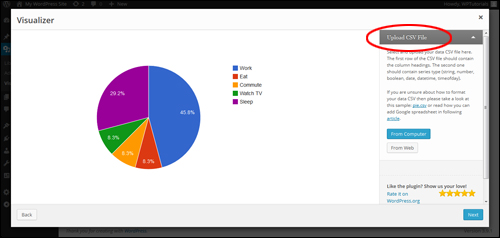
![]()
When creating your CSV data file, ensure that:
- Your first row contains the column headings.
- The second row contains the series type (e.g. boolean, datetime, etc.)
The screenshot below shows how to format your data as per the above requirements …
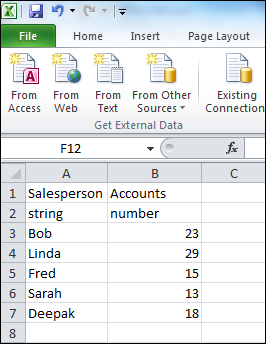
If you are not sure how to format your CSV file, just study the sample CSV file supplied with the plugin.
Once you have completed this step, select your data source (‘From Computer’ or ‘From Web’) in the ‘Upload CSV File’ section.
Upload CSV File From Computer
To upload the CSV file from your hard drive select ‘From Computer‘ …
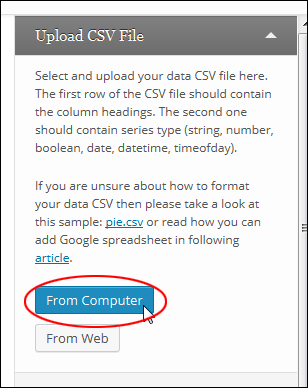
Locate and select your data file and then click on ‘Open‘ …
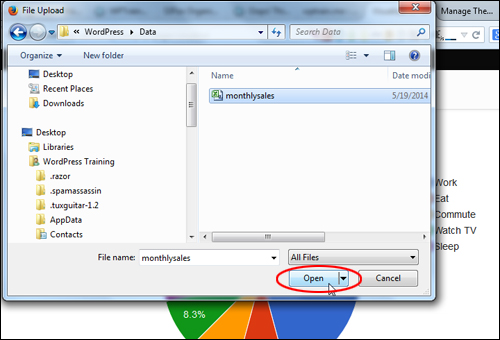
The plugin imports the data from the CSV file and displays it using the graph/chart type chosen …
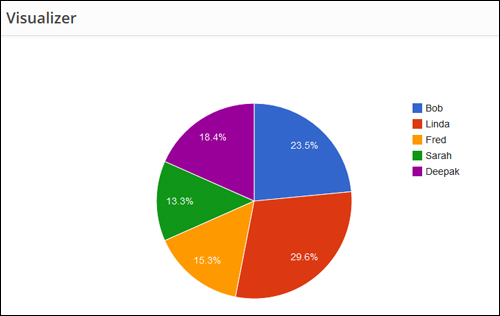
Upload CSV File From The Web
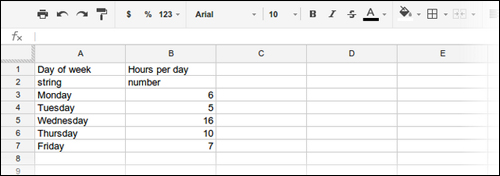
![]()
For a step-by-step tutorial that explains how to create, save and publish data to a Visualizer chart or graph using Google Spreadsheet, see the article below:
After importing your data, make sure that all of the information is correct (if not, click on the ‘Back’ button and reupload a data file with the correct data), and click ‘Next‘ …
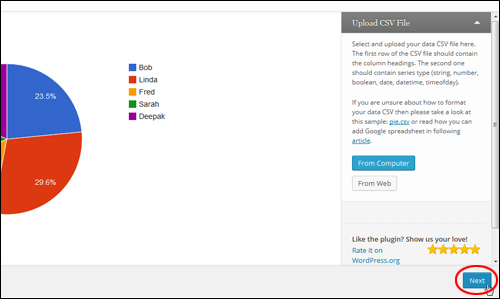
Depending on the chart or graph type you have selected, the plugin displays a range of customization settings …
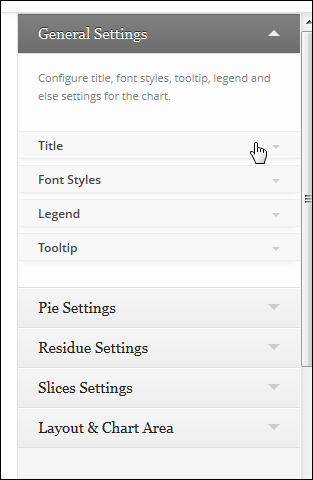
Visualizer gives you full control over your chart or graph, and updates your display in real time …

For example, the pie chart offers many configurable options, such as:
- General Settings – Configure settings for the chart’s title, font styles, tooltip, and legend.
- Pie Settings – Create 3D pie charts, draw slices counterclockwise, set the text content displayed on the slice, create a “donut” pie chart, rotate the chart’s “start” angle and set the slice border color.
- Residue Settings – Set the ‘Visibility Threshold’ (the slice relative part, below which a slice will not show individually.), ‘Residual Slice Label’ (the label for the combination slice that holds all slices below slice visibility threshold, e.g. “Other”), and ‘Residue Slice Color’.
- Slice Settings – Customize the ‘Slice Offset’ (how far to separate the slice from the rest of the pie), and ‘Slice Color’.
- Layout & Chart Area – Configure the layout (total size of chart) including the width and height of the chart as a number of percentage, background color for the main area of the chart and the chart border width and color, and the placement and size of the chart area (where the chart itself is drawn, excluding axis and legends).
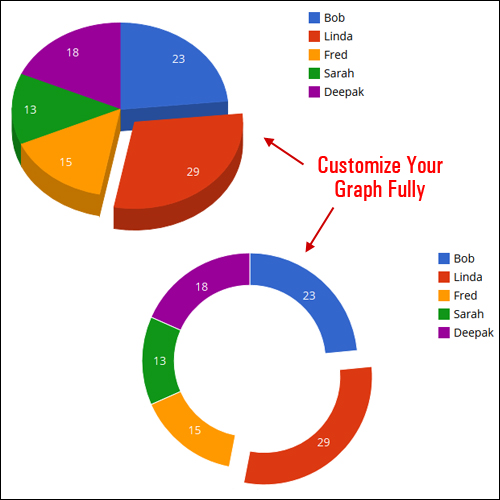
Once you’re happy with how your chart or graph is looking, click Create Chart …

Your chart or graph will now be added to the Visualizer ‘Library’ …
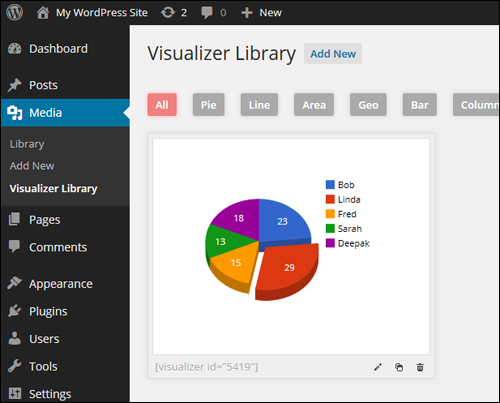
Note that every visual element is given a unique ID displayed as a shortcode. As you will see shortly, this lets you insert charts and graphs into your WordPress pages and posts easily and quickly …
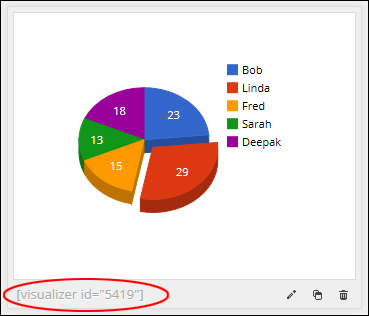
Charts and graphs added to the Visualizer Library can easily be accessed by type …
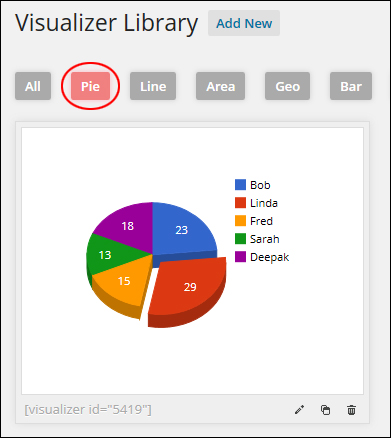
After a new item has been added to the ‘Visualizer Library’, you can edit it, clone it, or trash it …
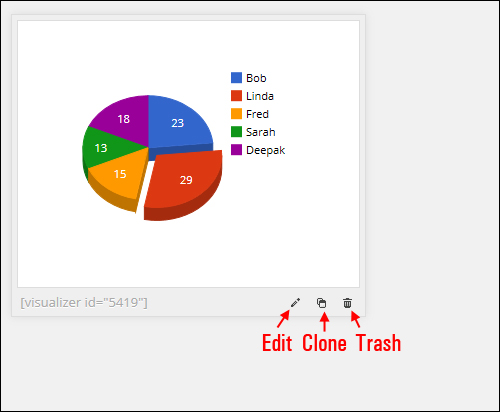
Visualizer Usage
Once you’ve created a chart or graph and added it to Visualizer, adding it to a post or page is really simple.
First, create a new post or page (or open an existing one) …
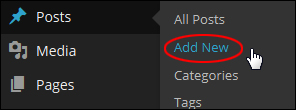
Next, place your mouse cursor where you would like to insert your visual element into your content and click on the ‘Add Media‘ button …
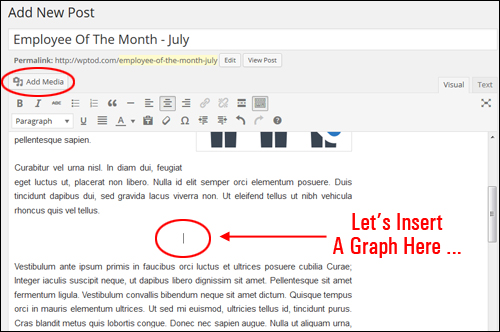
Click on ‘Visualizations‘ …
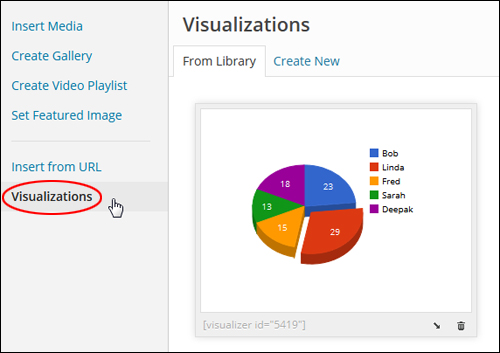
Find the chart or graph you want to insert into your content and click the “insert” icon …
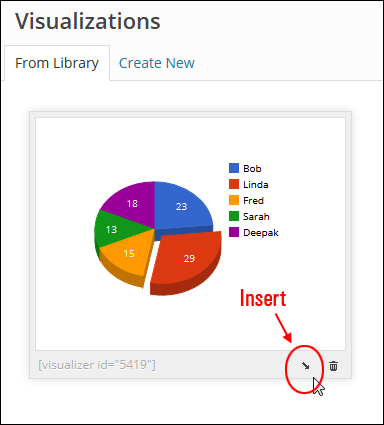
This inserts a shortcode for the element into your content …
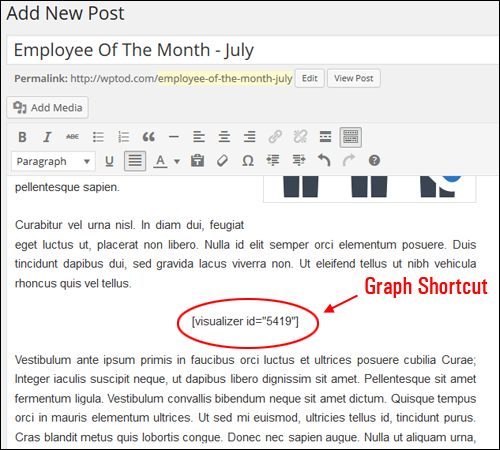
Once you have finished adding the visual element, click on Publish to publish (or update) your page or post …
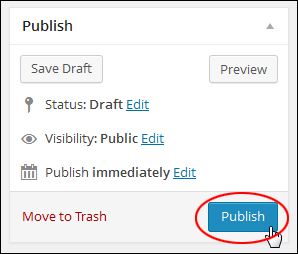
After updating your page/post, click ‘View post’ to see the result …
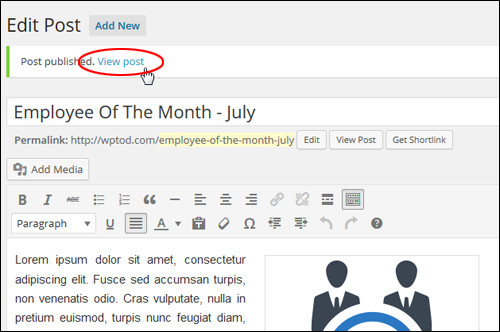
Your element will display in the content …
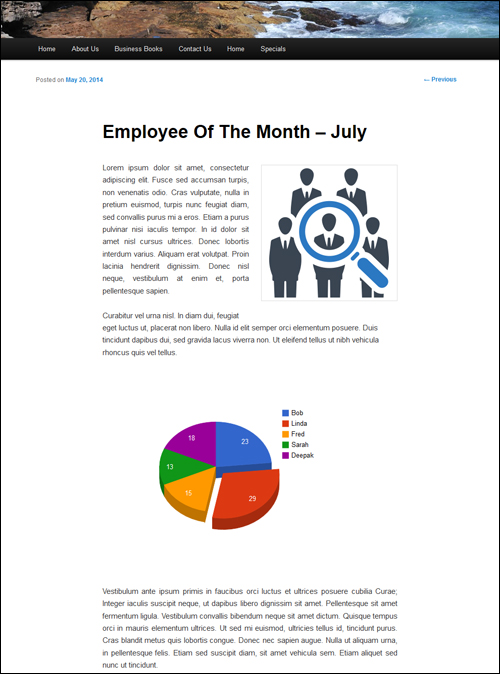
As mentioned previously, Visualizer also displays responsive charts and graphs for mobile device screens …
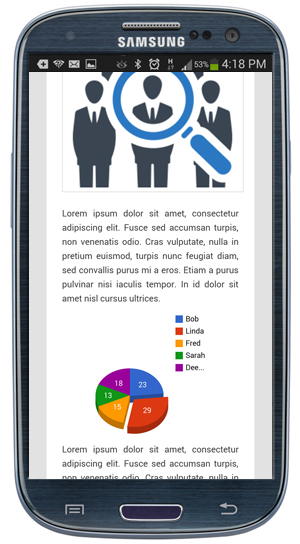
As you can see, WordPress Visualizer allows you to add and customize dynamic charts and graphs in your content. You can update your data and the changes will automatically be reflected wherever you have inserted your charts, graphs, comparison bars , etc. in your site. This makes managing dynamic graph information in WordPress very efficient.
![]()
The developers of this plugin have created a number of step-by-step tutorials you can use to learn how to edit, customize and use the plugin.
For additional tutorials on editing, cloning, deleting and adding data to your charts, refer to the website below:
Congratulations! Now you know how to easily insert colorful and interactive pie charts and graphs into WordPress with WordPress Visualizer plugin.
***
"Your training is the best in the world! It is simple, yet detailed, direct, understandable, memorable, and complete." Andrea Adams, FinancialJourney.org
***